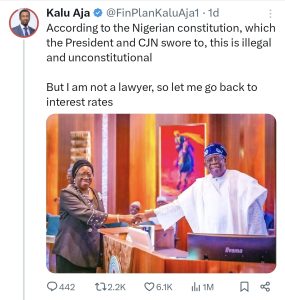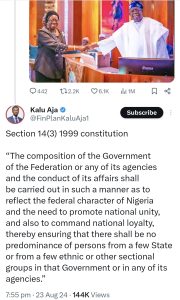By Michael Chibuzo
Yesterday, Kalu Aja who has built a reputation for himself as a master of hiding behind vague takes and false innuendos to propagate mischievous and sometimes highly erroneous narratives struck again. This time around, his target was the appointment of Justice Kudirat Kekere-Ekun as the Acting Chief Justice of Nigeria following the retirement of Justice Olukayode Ariwoola on Thursday.
Typical of Kalu, he posted on his X handle: “According to the Nigerian constitution, which the President and CJN swore to, this is illegal and unconstitutional. But I am not a lawyer, so let me go back to interest rates.”
This is typical Kalu Aja. He will post a vague statement without clear context and wait to see where the pendulum of reaction will swing. So, his first post did not state exactly why the appointment of Justice Kekere-Ekun is illegal or unconstitutional. He banked on the fact that his loyal followers who see him as an authority will swallow his position hook, line and sink and run with it. However after a while, Kalu eventually added another tweet to provide context to his earlier statement. What was the context you may ask?
Kalu said that the appointment of Justice Kekere-Ekun, who is the most senior justice of the Supreme Court to serve as Acting Chief Justice of Nigeria is unconstitutional and illegal because of a section 14(3) of the 1999 Constitution, which established the principle of federal character. Kalu quoted the said provision, which I will reproduce below:
“The composition of the Government of the Federation or any of its agencies and the conduct of its affairs shall be carried out in such a manner as to reflect the federal character of Nigeria and the need to promote national unity, and also to command national loyalty, thereby ensuring that there shall be no predominance of persons from a few State or from a few ethnic or other sectional groups in that Government or in any of its agencies.”
If this is the only provision upon which Kalu Aja based his submission, then it is very disturbing and alarming coming from such a man who seem to portray himself as almost all-knowing. It is important to tell Kalu Aja that the constitution, which he quoted to justify his claim actually provided in section 231(4) that:
“If the office of Chief Justice of Nigeria is vacant or if the person holding the office is for any reason unable to perform the functions of the office, then until a person has been appointed to and has assumed the functions of that office, or until the person holding has resumed those functions, the President shall appoint the most senior Justice of the Supreme Court to perform those functions.”
In this section 231(4), it did not make any room for discrimination on account of if the other arms of the Federal Government are already occupied by individuals from a particular tribe or state. It was specific, “the president shall appoint the most Senior Justice of the Supreme Court to perform the functions of the office of the Chief Justice of Nigeria“.
This is exactly what happened. Justice Olukayode Ariwoola retired leaving the office of the CJN vacant. President Bola Tinubu in line with the provisions of section 231(4) of the 1999 constitution appointed Justice Kudirat Kekere-Ekun being the most Senior Justice of the Supreme Court to act as the CJN pending when a substantive CJN is confirmed by the Senate. It is unbelievable how Kalu Aja would describe this act as illegal or unconstitutional.
Now let us even talk about appointing a substantive CJN as outlined in the 1999 constitution that Kalu Aja is defending. Section 231(1) of the 1999 constitution clearly outlined the process through which the appointment of a CJN shall be made. That section 231(1) states as follows:
“The appointment of a person to the office of Chief Justice of Nigeria shall be made by the President on the recommendation of the National Judicial Council subject to confirmation of such appointment by the Senate.”
So, basically the appointment of a CJN involves actions from the judiciary as represented by the National Judicial Council (NJC) that kickstarts the process by recommending the individual to be appointed to the President (executive) . The President then forwards the recommended name to the Senate for confirmation.
Marrying these provisions to the federal character principle, you will realise that even if the individual appointed as CJN by following the provisions of section 231(1) or (4) is from the same state as the President, the Senate President or even the Speaker of HoR, it does not contravene section 14(3) of the constitution because the federal character provision never specified any positions sharing formula. There was no basis therefore for Kalu to have declared the emergence of Justice Kekere-Ekun as unconstitutional or illegal.
It would have been illegal if there was a clear constitutional provision stating that under no circumstances and regardless of the provisions of other sections of the constitution would the three heads (keyword, heads) of the arms of the federal government hail from the same tribe or state but there is none.
Kalu Aja and others who share his views must realise that the federal character does not apply in elective posts such as President, Vice President, NASS presiding officers and even the choice of the CJN. The constitution never said that a political party must select its candidate for president and vice president from different places, neither does the constitution mandate the national assembly to exclude lawmakers from the President’s or vice President’s zone/state during contests for presiding officers of the national assembly. That would no longer be democracy if the constitution did that!
It is important that I point out that the dynamics of leadership at the top of the three arms of government is fluid and one that cannot be subjected to federal character because of the nature of recruiting the leadership, which involves election. The government of the Federation is randomly composed by voters through election. The constitution guarantees the freedom of citizens to choose their leaders.
Anybody from anywhere can be president or vice president once majority of voters vote for them. Anybody from any constituency can be a Senator or House of Reps member. From amongst the senators and house of representatives members, anyone of them can be selected by the others to become Senate President, Deputy Senate President, Speaker, Deputy Speaker etc.
The recruitment into the office of the CJN is not elective but follows laid down procedures, which also has safeguards. For example, the NJC that recommends the individual to be appointed as CJN is composed of 24 members which include: the CJN, the next senior supreme Court Justice, President of Court of Appeal, five retired justices selected from the Supreme or Appeal Court, Chief Judge of the Federal High Court, President of the National Industrial Court, five Chief Judges of States who are rotated every two years, one Grand Kadi and one President of the Customary Court of Appeal both of whom shall be rotated every two years and five members of the Nigerian Bar Association who would be recommended by the NBA executive committee.
The above composition of the NJC follows the principle of federal character. Therefore if a body that complies with federal character unanimously recommends one of its members to be appointed as Chief Justice of Nigeria, who is Kalu Aja to claim federal character principle was violated because of the name of the individual so recommended by the NJC? Is this not madness?
I believe strongly that the problem with Kalu Aja is his jaundiced interpretation of the federal character provision. He thinks federal character means, for every six position you select (whether elective or appointive), each geopolitical zone or tribe must be represented otherwise federal character provision has been violated.
It is time Kalu Aja and others like him are made to understand that federal character is taken as a whole whether one is calculating representation at the governmental level or at the level of agencies. To prove violation in the federal character, you must list all appointed positions in the executive (SGF, personal aides of the President, Ministers, Special Advisers/Assistants, Heads of Departments and Agencies, Permanent Secretaries of Ministries, Board Chair/Members), legislature (Heads of Committees, national assembly bureaucracy, heads of agencies under NASS etc) and judiciary (all Federal High Court judges, Appeal Court Justices, Supreme Court Justices, Industrial Court justices, Code of Conduct Tribunal etc).
After listing these positions, you can then analyse to see if any section of the country is not represented proportionately. You do not select the top six positions in the country and begin to do federal character calculations. There is no way the entire nationalities or tribes in Nigeria can be evenly represented when your sample size is just six people. Kalu Aja, as a number man should know this.
Finally, I must point out that the principle of federal character is one of the very loose provisions of the 1999 constitution, that one cannot easily conclude it has been breached by surface analysis. This is because there are thousands of positions that has to be viewed together to arrive at a conclusion whether there is a predominance of persons from a few State or from a few ethnic or other sectional groups in that Government or in any of its agencies. Arriving at a verdict of violation of the federal character principle by simply looking at six top leadership positions, five of which are elective is borderline mischief. That is what Kalu Aja is simply trying to do – mischief!



